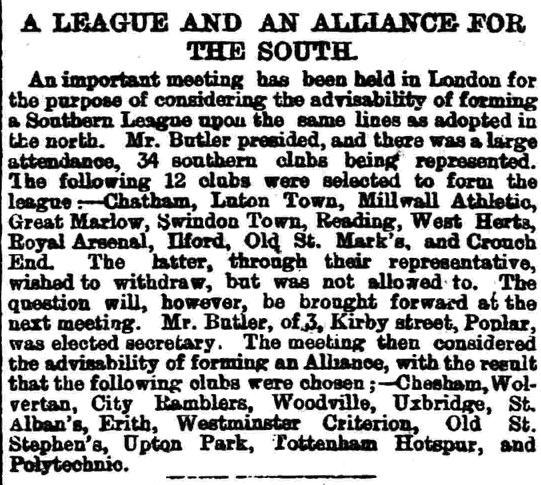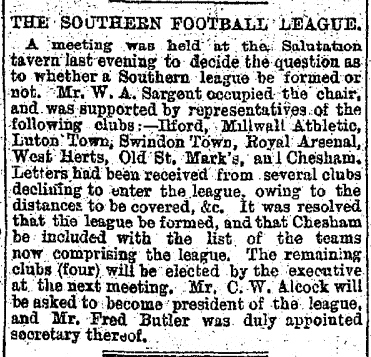by Andy Kelly
Having turned professional in 1891, Royal Arsenal organised a number of high-profile friendlies against the big clubs from the north and Midlands. They also, contrary to popular belief, continued to play friendlies against clubs from London and the south. The friendlies proved to be lucrative for Royal Arsenal but the committee knew that it was unlikely that the club’s fans would be satisfied with a fare of friendlies and the occasional FA Cup game.
Having seen the success of the Football League, the Royal Arsenal committee lobbied clubs from London and the south in an attempt to form a Southern Football League. This was not the first time that a league for the south had been discussed. The London FA had held a meeting on 13 March 1890 to consider the possibility. The members were split almost 50/50 and the idea was defeated by 47 votes to 46.
In February 1892, Royal Arsenal sent letters to the prominent clubs in the south of England inviting them to a meeting to, once again, discuss the formation of a Southern League. On 24 February 1892, representatives of 34 clubs met at the Anderton Hotel in Fleet Street, London. The attendees agreed to form a Southern League, and a vote was held at the end of the meeting to decide which teams would participate. The following teams were elected:
Chatham, Chiswick Park, Crouch End, Ilford, Luton Town, Marlow, Millwall Athletic, Old St Marks, Reading, Royal Arsenal, Swindon Town and West Herts.
And the following teams formed the Southern Alliance (effectively a second division):
Chesham, City Ramblers, Criterion, Erith, Old St Stephens, St Albans, Tottenham Hotspur, Upton Park, Uxbridge, Westminster, Wolverton and Woodville.

The story that has been told over the years is that the representatives went back to their clubs and reported the outcome of the meeting to their committees. The London FA committee then put pressure on the clubs saying that they would be expelled from the London FA if they were to play the professionals of Royal Arsenal.
However, this was not so. As we know, in 1891 the members of the London FA had voted against the London FA’s committee’s motion to ban members who played against Royal Arsenal. All members were free to play Royal Arsenal and many already had during 1891-92 without censure.
The actual reason that the initial attempt for Southern League failing was finance. A number of the clubs realised that they would have to commit themselves to play games and incur travel expenses. In less than a fortnight Chatham, Chiswick Park, Crouch End, Marlow and Reading had all dropped out. A further meeting was held on 5 March to decide whether the venture could continue. The remaining seven clubs invited Chesham to join them and an eight-team league was agreed upon.
Interest continued to wane and, eventually, the league fell apart. The Southern Alliance did manage to get going for the 1892-93 season. However, it wasn’t a success with many games not being played.
The Southern League eventually got off the ground in 1894. By this time Arsenal had joined the Football League and decided not to join the Southern League. To further disprove the story of the London FA threatening to expel members who played against the professional Royal Arsenal, the Southern League of 1894-95 included a mixture of professional teams (Chatham, Luton, Millwall, Southampton St Mary’s and Swindon Town had all followed Arsenal’s lead) and amateur teams (Clapton, Ilford Reading and Royal Ordnance Factories). The London FA did not admit professional teams until 1908 and had no control over the Southern League.
Arsenal finally entered a team in the Southern League in 1938 when its ‘A’ team finished 6th. There is one more connection with the Southern League. Between 1934 and 1938, Margate FC became Arsenal’s nursery team. They won the Southern League Central Section and Eastern Section in 1935-36, and the Midweek Section in 1936-37.


